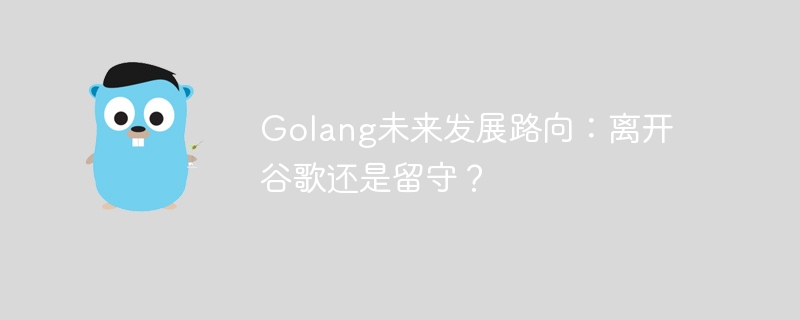Home >Backend Development >Golang >Golang's future development path: Leave Google or stay?
Golang's future development path: Leave Google or stay?
- WBOYWBOYWBOYWBOYWBOYWBOYWBOYWBOYWBOYWBOYWBOYWBOYWBOriginal
- 2024-03-05 13:45:03628browse

Golang’s future development path: Leave Google or stay?
With the rapid development of Internet technology, programming languages are also constantly evolving. Among them, Golang (Go language), as a strongly typed, strong concurrency, statically compiled language, has attracted much attention. Since it was released by Google in 2007, Golang has become one of the first choices for many developers and is widely used in network services, cloud computing, data analysis and other fields. However, in recent years, some speculation and controversy about the future development of Golang have gradually surfaced. One of the hot topics is whether Golang should continue to rely on Google or develop independently. This article analyzes the future development direction of Golang and discusses the pros, cons and possible impacts of leaving Google or staying behind.
First of all, let us take a look at the current development of Golang at Google. Since the release of Golang, Google has been the main supporter and promoter of the language, investing a lot of resources in the development, maintenance and promotion of Golang. Many projects within Google use Golang as the main development language. It can be said that Google's support is one of the important factors for Golang's success. In addition, Google will continue to optimize Golang and ensure that it can meet the growing technical needs, so that Golang remains active in the developer community and continues to grow in the ecosystem. Therefore, some people believe that Golang should continue to stay at Google and maintain its current development model.
However, some people have also expressed the view of leaving Google. They believe that Golang should be developed independently of Google, which can avoid being affected by internal changes at Google and contribute to wider promotion and acceptance. In fact, although Google is the birthplace and largest supporter of Golang, Golang's application around the world is also growing, and the developer community is gradually expanding. If Golang can get rid of its dependence on Google, it will be more likely to obtain more opportunities and resources and play its role in more fields. Moreover, independent development can also enhance Golang's independence and sustainability, so that it will not be controlled by any one company.
For Golang, there are pros and cons to leaving or staying. If you stay at Google, you may continue to receive a lot of resources and support and maintain stable development, but you will also face the risk of being restricted by Google's internal policies and decisions. If you choose to leave, Golang may face greater challenges and risks, but it will also have more autonomy and room for development. Before making a decision, the Golang team needs to carefully evaluate these two options, weigh the pros and cons, and formulate an appropriate development strategy.
In general, regarding the future development direction of Golang, the question of leaving Google or staying behind is not a black and white choice, but requires a comprehensive consideration of various factors. No matter what development model Golang ultimately chooses, it should continue to improve itself and maintain vitality and competitiveness with the purpose of promoting technological innovation, serving the developer community and promoting industry development. I believe that with the joint efforts of developers, Golang will usher in a better future.
The above is the detailed content of Golang's future development path: Leave Google or stay?. For more information, please follow other related articles on the PHP Chinese website!
Related articles
See more- What industries will develop with 5g?
- What are the various stages of computer development marked by?
- What three stages has the development of database management technology gone through?
- What data types are there in go language?
- How to solve the problem that Google Chrome cannot open web pages in Windows 10 system

